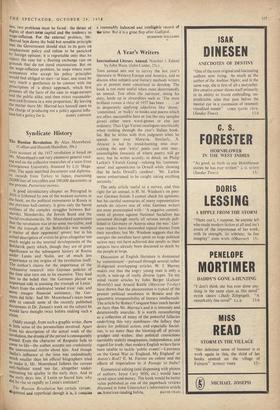• A Year's Writers
THIS annual sets out to survey the last year's literature in Western Europe and America, and to discuss what subjects.and literary methods writers are at present most concerned to develop. The book is not most useful when most determinedly an annual. Too often the surveyor, doing his duty, lands up in absurdities such as 'The most brilliant roman a these of 1957 has been . . .', or in desperately applying adjectives like 'dense,' 'committed,' or 'bulky' to books and poems which are often inaccessible here or (on the tiny samples given) either mere word-games or else just ordinary. Thus Ugo Varnai catalogues uncritically when rushing through the year's Italian book- list. But he writes with firm judgment when he spends time over Moravia. Similarly, A. Alvarez is led by trend-hunting into over- valuing the new 'witty' poets and into near- unintelligible .forecasts of where poetry will go next; but he writes acutely, in detail, on Philip Larkin's 'Church Going'—relating his 'common- sense' and agnosticism to Orwell while • showing that he lacks Orwell's candour : `Mr. Larkin seems embarrassed to be caught taking anything seriously.'
The only article useful as a survey, and thus right for an annual, is H.. M. Waidson's on post- war German fiction. I cannot check his opinions, but his careful summaries of many representative novels do inform one of what German writers are most preoccupied with : 'A negative commit- ment of protest against National Socialism has remained through nearly all serious novels pub- lished in Germany or Austria since the war.' Ger- man readers have demanded topical themes from their novelists; but Mr. Waidson suggests that the energies the novelists have spent on huge political satires may not have achieved due results as their subjects have already been discussed to death by the people at large.
Discussion of English literature is dominated by 'commitmenr—pursued through several rather ill-digested overlapping articles. W. J. Harvey makes out that the angry young man is only a .myth, a mix-up of really diverse types. To my mind recent articles by John Berger (Labour Ikhmthly) and Arnold Kettle (Marxism To-day) have shown that the phenomenon is typical of the present political numbness in Britain and the egocentric irresponsibility of literary intellectuals. The article by Robert Conquest bites much harder on facts than Mr.,Harve-y's and it.is. intensely and determinedly anarchic. it is worth remembering as a' collection of many of the powerful fallacies underlying this very numbness—the fallacy that desire for political action, and especially Social- ism, is no more than the blowing-off of private
-grudges and wishes; that political convictions inevitably stultify imagination, independence, and regard for truth; that modern English writers have been unable to tackle 'public events'—Lawrence on the Great War in 'England, My England' or Aaron's Rod? E. .M. Forster on colour and the effects of imperialism in A Passage to Melia?
Economical editing (and dispensing with photos of authors, Joyce Cary MSS, etc.) would ha.ve saved space and money. The book would be better value published as one of the paperback reviews discussed in John Unterecker's informative article
on American reading habits. DAVID CRAIG


































 Previous page
Previous page